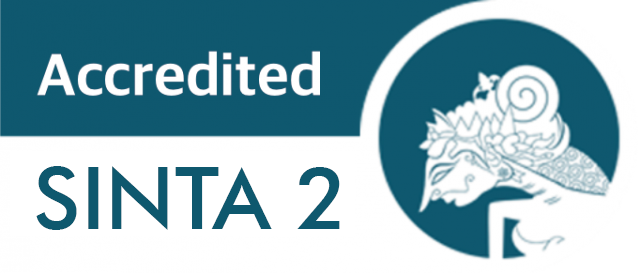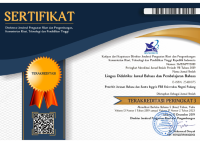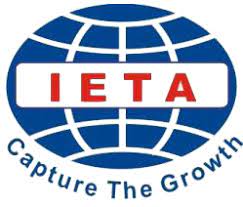EFL Students’ Experiences on Transactional Speaking Projects
 ), Eni Rosnija(2),
), Eni Rosnija(2), (1) Universitas Tanjungpura
(2) Universitas Tanjungpura
 Corresponding Author
Corresponding Author
Copyright (c) 2023 Lingua Didaktika: Jurnal Bahasa dan Pembelajaran Bahasa
DOI : https://doi.org/10.24036/ld.v17i1.120676
Full Text:
 Language : en
Language : en
Abstract
Keywords
References
Arfiyantama, Riko. (2015). Video making project to improve students‟ autonomy and ability in transactional and interpersonal conversations. Journal of English Language and Education, 1,( 1), 32
Beard, Collin. & Wilson, J.P. (2013). Experiential learning : A handbook for education, training and coaching. London: Kogan Page
Chu, S. K. W. & et al (2017). 21st century skills development through inquiry-based learning: from theory to practice. Singapore: Springer.
Cohen. L., Manion, L., & Morrison. K. (2018). Research methods in education. eighth edition. New York: Routledge.
Coleman, J. A. (1992 ). Project-based learning, transferable skills, information technology and video, Language Learning Journal, 5, 35-37.
Damanik. B.A.R. (2018). Students’ problems in transactional speaking on english foreign learners (efl) FKIP nommensen pematangsiantar. International Journal of English Literature and Social Science, 3, (6), 996
Greene, J.O. & Burleson, B.R. (2003). Communication and social interaction skills. New Jersey : Lawrence Erlbaum Associates, Inc.
Griffin & Care. (2015). Assessing and teaching of 21century skills: Methods and approaches. New York: Springer.
Kotti, D. (2008). Experiential learning from theory to practice. Adult Education, 13, 35-41.
Krajcik, J. S., Blumenfeld, P. C., Marx, R. W., & Soloway, E. (1994). A collaborative model for helping middle-grade science teachers learn project-based instruction. The Elementary School Journal, 94, 483-497.
Kolb, D.A. (2015). experiential learning : Experience as the Source of Learning and Development. (2nd e.d.). New Jersey: Pearson Education, Inc.
Krauss, Jane. & Boss, Suzie. (2013). Thinking through project-based learning: Guiding deeper inquiry. California: Corwin.
Krauss, Jane. & Boss, Suzie. (2007). Reinventing project-based learning: Your field guide to rela-world projects in the ditigal era. Washington. D.C : International Society for Technology in Education.
Lam, N.T.V, (2011). Project-based learning in teaching English as a foreign language. Journal of Science, Foreign Languages, 27, 140-146
Richards, Jack C. (2008). Teaching listening and speaking : from theory to practice. Cambridge. Cambridge University Press.
Siahaan, Chontina. & Sihotang, Hotmaulina. (2021). Effectiveness of transactional communication in the implementation of collegiate curriculum. Advances in Social Sciences Research Journal, 8, (2), 225-237
Silberman, M. (2007). The handbook of experiential learning. San Francisco: Pfeiffer.
Stivers, J. (2010). Project Based Learning: A dynamic approach to teaching in which students explore real-world problems and challenges, simultaneously developing 21st century skills while working in small collaborative groups. Educational Psychology. Fall, 2-8.
Thomas, W. J. (2000). A review of research on project-based learning. Retrieved from www.bobpearlman.org/BestPractices/PBL_Research.pdf
Trilling, B., & Fadel, C. (2009). 21st century skills: Learning for life in our times. San Francisco: CA: Jossey-Bass.
 Article Metrics
Article Metrics
 Abstract Views : 212 times
Abstract Views : 212 times
 PDF Downloaded : 114 times
PDF Downloaded : 114 times
Refbacks
- There are currently no refbacks.
Copyright (c) 2023 Lingua Didaktika: Jurnal Bahasa dan Pembelajaran Bahasa

This work is licensed under a Creative Commons Attribution-NonCommercial 4.0 International License.









